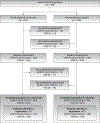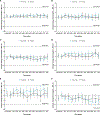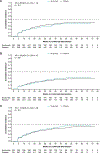Health-related Quality of Life with Adjuvant Nivolumab After Radical Resection for High-risk Muscle-invasive Urothelial Carcinoma: Results from the Phase 3 CheckMate 274 Trial
- PMID: 35288066
- PMCID: PMC10062393
- DOI: 10.1016/j.euo.2022.02.003
Health-related Quality of Life with Adjuvant Nivolumab After Radical Resection for High-risk Muscle-invasive Urothelial Carcinoma: Results from the Phase 3 CheckMate 274 Trial
Abstract
Background: The programmed death-1 (PD-1) inhibitor nivolumab prolongs disease-free survival in patients with muscle-invasive urothelial carcinoma (MIUC).
Objective: To evaluate the effects of nivolumab on health-related quality of life (HRQoL) after radical resection in patients with MIUC.
Design, setting, and participants: We used data from 709 patients in CheckMate 274 (NCT02632409; 282 with programmed death ligand 1 [PD-L1] expression ≥1%), an ongoing randomized, double-blind, placebo-controlled phase 3 trial of adjuvant nivolumab.
Intervention: Intravenous injection of nivolumab (240 mg) or placebo every 2 wk for ≤1 yr.
Outcome measurements and statistical analysis: HRQoL was assessed using the European Organisation for Research and Treatment of Cancer Quality of Life Questionnaire (EORTC QLQ-C30) and the EQ-5D-3L. Linear mixed-effect models for repeated measures were used to compare nivolumab and placebo on changes in HRQoL. Time to confirmed deterioration (TTCD) of HRQoL was analyzed by Cox proportional hazards regression.
Results and limitations: In the full HRQoL evaluable population, no clinically meaningful deterioration of HRQoL was observed in either treatment arm. Moreover, nivolumab was noninferior to placebo on changes from baseline for all main outcomes. The median TTCD for fatigue was 41.0 wk for nivolumab and 44.3 wk for placebo (hazard ratio [HR]: 1.11, 95% confidence interval [CI], 0.89-1.39). For the visual analog scale, the median TTCD was not reached for nivolumab and it was 57.6 wk for placebo (HR: 0.78, 95% CI, 0.61-1.00). The median TTCD for the other main outcomes was not reached in either treatment arm. The findings were similar for patients with PD-L1 expression ≥1%.
Conclusions: These results demonstrate that nivolumab did not compromise the HRQoL of patients with MIUC in CheckMate 274.
Patient summary: Nivolumab is being researched as a new treatment for patients with bladder cancer (urothelial carcinoma). We found that nivolumab maintained quality of life while increasing the time until cancer returns in patients whose bladder cancer had spread or grown and who had unsuccessfully tried platinum-containing chemotherapy.
Keywords: Adjuvant; Bladder cancer; Immunotherapy; Invasive; Nivolumab; Phase 3; Quality of life; Radical cystectomy; Randomized controlled trial.
Copyright © 2022 The Authors. Published by Elsevier B.V. All rights reserved.
Figures




Comment in
-
Quality of Life Data in CheckMate 274: Does It Move the Needle?Eur Urol Oncol. 2022 Oct;5(5):564-565. doi: 10.1016/j.euo.2022.03.008. Epub 2022 Apr 26. Eur Urol Oncol. 2022. PMID: 35484055 No abstract available.
References
-
- Abdollah F, Gandaglia G, Thuret R, et al. Incidence, survival and mortality rates of stage-specific bladder cancer in United States: a trend analysis. Cancer Epidemiol 2013;37:219–25. - PubMed
-
- Witjes JA, Bruins HM, Cathomas R, et al. European Association of Urology guidelines on muscle-invasive and metastatic bladder cancer: summary of the 2020 guidelines. Eur Urol 2021;79:82–104. - PubMed
-
- Zaid HB, Patel SG, Stimson CJ, et al. Trends in the utilization of neoadjuvant chemotherapy in muscle-invasive bladder cancer: results from the National Cancer Database. Urology 2014;83:75–80. - PubMed
Publication types
MeSH terms
Substances
Associated data
Grants and funding
LinkOut - more resources
Full Text Sources
Medical
Research Materials

